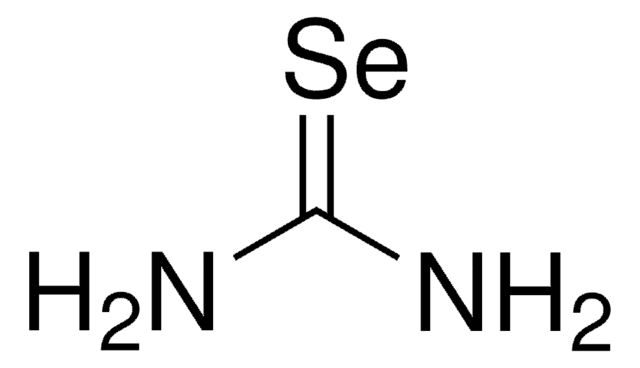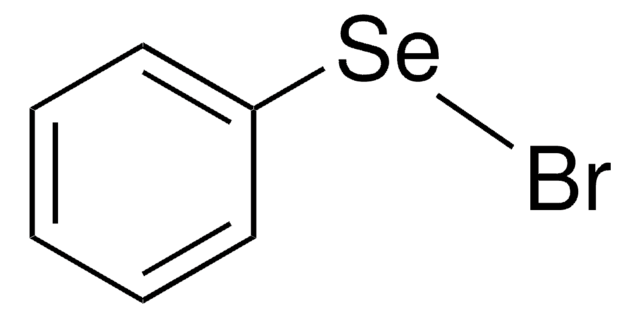483699
Potassium selenocyanate
ReagentPlus®, ≥99%
Synonym(s):
Selenocyanic acid potassium
Sign Into View Organizational & Contract Pricing
All Photos(2)
About This Item
Linear Formula:
KSeCN
CAS Number:
Molecular Weight:
144.08
Beilstein:
3912121
EC Number:
MDL number:
UNSPSC Code:
12352302
PubChem Substance ID:
NACRES:
NA.23
Recommended Products
Quality Level
product line
ReagentPlus®
Assay
≥99%
form
solid
technique(s)
NMR: suitable
mp
147 °C
SMILES string
[K][Se]C#N
InChI
1S/CHNSe.K/c2-1-3;/h3H;/q;+1/p-1
InChI key
KYEKHFSRAXRJBR-UHFFFAOYSA-M
Looking for similar products? Visit Product Comparison Guide
Application
Increasing interest in solid state NMR of heavy-metal nuclei results in the preparation of several Hg-thiocyanate and selenocyanate compounds as potential models.
Legal Information
ReagentPlus is a registered trademark of Merck KGaA, Darmstadt, Germany
Signal Word
Danger
Hazard Statements
Precautionary Statements
Hazard Classifications
Acute Tox. 2 Oral - Acute Tox. 3 Inhalation - Aquatic Acute 1 - Aquatic Chronic 1 - STOT RE 2
Storage Class Code
6.1A - Combustible acute toxic Cat. 1 and 2 / very toxic hazardous materials
WGK
WGK 3
Flash Point(F)
Not applicable
Flash Point(C)
Not applicable
Personal Protective Equipment
dust mask type N95 (US), Eyeshields, Gloves
Choose from one of the most recent versions:
Already Own This Product?
Find documentation for the products that you have recently purchased in the Document Library.
Customers Also Viewed
Mark P de Souza et al.
Plant physiology, 128(2), 625-633 (2002-02-14)
Selenocyanate (SeCN(-)) is a major contaminant in the effluents from some oil refineries, power plants, and in mine drainage water. In this study, we determined the potential of Indian mustard (Brassica juncea) and muskgrass (a macroalga, Chara canescens) for SeCN(-)
Denina Bobbie Dawn Simmons et al.
Environmental science & technology, 45(6), 2165-2171 (2011-02-24)
The common green fresh water algae Chlorella vulgaris was exposed to starting concentrations of 10 μg/L selenium in the form of selenate, selenite, or selenocyanate (SeCN(-)) for nine days in 10% Bold's basal medium. Uptake of selenate was more pronounced
Xiaoguang Meng et al.
Water research, 36(15), 3867-3873 (2002-10-09)
Batch experiments were conducted to investigate the removal of selenocyanate (SeCN-) from oil refinery wastewater and artificial wastewater with elemental iron [Fe(0)]. The chemical forms of selenium in the reacted solids were determined with X-ray photoelectron spectroscopy (XPS) and a
Hyewon Son et al.
The journal of physical chemistry. B, 116(30), 9152-9159 (2012-07-04)
Spectroscopic properties (i.e., peak positions and widths) of vibrational probes are sensitively dependent on their local environments in liquids. Such spectroscopic sensitivities can be utilized for studying the structures and dynamics of a variety of molecular systems. Here, we have
Rajmund Mokso et al.
Physical chemistry chemical physics : PCCP, 10(28), 4138-4146 (2008-07-10)
The microwave spectra of propa-1,2-dienyl selenocyanate, H(2)C==C==CHSeC[triple bond]N, and cyclopropyl selenocyanate, C(3)H(5)SeC[triple bond]N, are reported. The spectra of the ground and two vibrationally excited states of the (80)Se isotopologue and the spectrum of the ground state of the (78)Se isotopologue
Our team of scientists has experience in all areas of research including Life Science, Material Science, Chemical Synthesis, Chromatography, Analytical and many others.
Contact Technical Service





![1-Chloromethyl-4-fluoro-1,4-diazoniabicyclo[2.2.2]octane bis(tetrafluoroborate) >95% in F+ active](/deepweb/assets/sigmaaldrich/product/structures/206/487/53d52ee5-ef71-4e9a-9bc8-938b68b98d5d/640/53d52ee5-ef71-4e9a-9bc8-938b68b98d5d.png)












